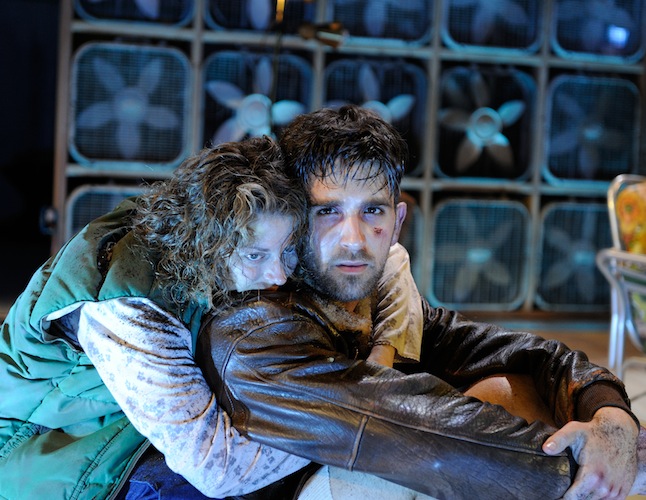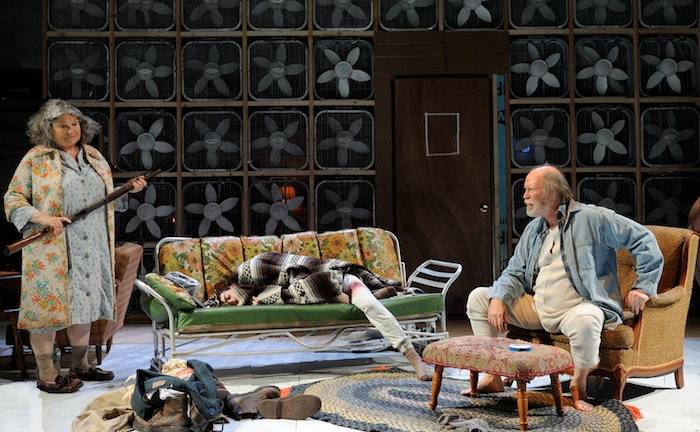Theater Review: “A Lie of the Mind” – Trinity Rep’s Excellent 50th Anniversary Gift
Critic Eric Bentley valued the theater of audacity above all, and that is just what is on glorious display in Trinity Rep’s marvelously nervy A Lie of the Mind.
A Lie of the Mind, by Sam Shepard. Directed by Brian Mertes. Music written and performed by Philip Roebuck. Set Design by Eugene Lee. Staged by the Trinity Repertory Company at the Lederer Theater Center, the Sarah and Joseph Jr. Theater, Providence, R.I., through June 29.

Rebecca Gibel as Sally and Benjamin Grills as Jake in Sam Shepard’s “A Lie of the Mind,” at the Trinity Repertory Company. Photo: Mark Turek.
By Bill Marx
The final production of Trinity Repertory Company’s 50th anniversary, a smashingly nervy production of Sam Shepard’s dark, unruly study of American dysfunction, testifies to the continuing artistic vitality of the venerable troupe. Critic Eric Bentley valued the theater of audacity above all, and that is just what is on glorious display here – exciting direction, terrific set, conceptual ambition, visual panache, haunting original music, and agile performances, all at the service of confronting conflicting realities, wrong versus wrong and right versus right. Hegel quipped that the latter was the definition of tragedy; for Shepard, the former is the paralytic state of American life.
The mangy opacities that Shepard trades in, from his language, which careens from the mundane to the lyric, to the surreality of the play’s action and imagery, have become theatrical sins today, particularly among our more well-heeled companies and successful dramatists. Accessibility is the golden rule. (Never leave the customers baffled.) A Lie of the Mind‘s central conflict is clear enough – Jake beats his wife Beth so badly that she is left with brain damage. She goes back home to recuperate with her rural Montana family. At first, Jake tells himself he killed his wife and and then seeks forgiveness from Beth. But over the course of the play Jake, Beth, and their families in California and in Montana deconstruct in a variety of bizarre ways, their energies warped (or in some cases set free) as they grapple with the aftermath of domestic abuse. Disorientation, amnesia, and aggression are among the responses of characters who struggle to deny facts, seek revenge, or love again.
Shepard’s figures are (in part) edgy metaphors for broken psyches, fragmented personalities yearning to be made whole. The play did not strike me, at least in this moving production, to be romantic or hopeful, as Trinity Rep Artistic Director Curt Columbus argues in his program notes. It amounts to a demand that deep emotional injuries and divisions be acknowledged, to not let them fester. Shepard is probing fundamental riffs: between men and women, truth and falsehood, life and death. There is no reassuring resolution: Jake’s cleansing realization that he has been cocooned in lies is followed by flickers of an ambiguous (?) apocalypse.
I don’t recall a lot about the 1987 Trinity Rep production of A Lie of the Mind, but the production was firmly grounded in a realistic context, and the two families were kept physically apart, slowly moving closer and closer together until the final explosive clash. Trinity director Brian Mertes corrals the action into a central playing area (brilliantly designed by Eugene Lee), with a wall of over 50 (working) electric fans (with a door in the middle) at the back and a kiddy pool in the front. There’s a winch overhead that at one point carries half of a dead deer and later a remorseful Jake. Barbed wire and toy airplanes hang in the air as well. Director Mertes adds some distinctive curiosities of his own, particularly in the way he highlights the elements of earth, air, fire, and water. His concentrated approach, with its mix of abstraction and physicality (such as dips in the kiddie pool) generates compelling pictures of a mind in agony, which is very much in the spirit of Shepard’s enigmas and theatricality.
I continue to feel, as I did when I saw the earlier Trinity Rep production, that the dramatist crams too much in as he attempts to sum up his vision of American delusion (Shepard’s premiere production clocked in at 4 and 1/2 hours; the Trinity Rep production is three hours long). Still, it is rare these days to talk about a production that gives too much rather than too little — this show never lets up. The music, written and performed by Phillip Roebuck, is generally made up of lowdown country Americana (with a ballad or two tossed in): Roebuck’s striking appearance in the first act, in which he takes center stage and performs a raw banjo stomp, fits the spirit of the play perfectly.

Anne Scurria as Meg and Timothy Crowe as Baylor in Sam Shepard’s ” A Lie of the Mind” at Trinity Repertory Company. Photo: Mark Turek.
The performances are uniformly strong, with the relative newbies holding their own with the Trinity Rep veterans. Anne Scurria and Timothy Crowe play Beth’s parents, Meg and Baylor, and the pair generate exquisite black comedy out of a deadpan battle of the sexes, a tussle that is alternately spacey and ugly. Men are lost, and the women in the play know it and say so. Guys yearn to live without females (makes it easier to kill things) and the gals are only too willing to let them go. The argument for the power of love is made, ironically, by Jake and Beth, who cannot live with or without each other — the violent self-hatred of the male shatters efforts to turn fear into nurturing. As Jake, Benjamin Grills is fine, though he could be more explosive at the beginning, more threatening, before he falls under the influence of his smothering mother, Lorraine, played by Janice Duclos with sardonic panache. Charlie Thurston, as Jake’s well-meaning brother Frankie, supplies the character’s earnestly ineffectual strength, while Billy Finn is properly obsessed as Sally’s over-protective brother, Mike, a would-be avenger who degenerates into a figure of fatigued frustration. As Beth, Britt Faulkner manages to pull off a challenging transformation, turning from speech-impared victim to rejuvenated man-hunter. Rebecca Gibel, as Jake’s sister Sally, skillfully probes the trauma behind the character’s isolation and guilt.
The only other Trinity Rep staging I caught during this celebratory season was a solid presentation of Christopher Durang’s cheery but vapid Vanya and Sonia and Masha and Spike, a 2013 Tony award-winning comedy that tells oldster characters on stage (and in the audience) that it is never to late to make something of your life. Unsurprisingly, it has become the play du jour on the major regional theater circuit around the country: the Huntington Theatre Company is producing the script next season. Somebody figures it is a surefire winner, so it is being done everywhere. A Lie of the Mind is a reminder that Trinity Rep can and should do what others are not doing, go where other companies are reluctant to tread. This production, easily one of the best of the year, is not about recycling entertainment formulas or making theater that is neat and transparent. Serious theatergoers take note of this anniversary gift.
Bill Marx is the Editor-in-Chief of The Arts Fuse. For over three decades, he has written about arts and culture for print, broadcast, and online. He has regularly reviewed theater for National Public Radio Station WBUR and The Boston Globe. He created and edited WBUR Online Arts, a cultural webzine that in 2004 won an Online Journalism Award for Specialty Journalism. In 2007 he created The Arts Fuse, an online magazine dedicated to covering arts and culture in Boston and throughout New England.
Tagged: A Lie of the Mind, Brian Mertes, Eugene Lee, Sam Shepard
